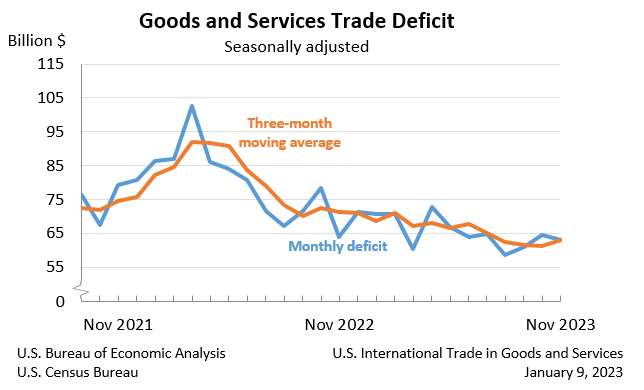Welcome to DU!
The truly grassroots left-of-center political community where regular people, not algorithms, drive the discussions and set the standards.
Join the community:
Create a free account
Support DU (and get rid of ads!):
Become a Star Member
Latest Breaking News
Editorials & Other Articles
General Discussion
The DU Lounge
All Forums
Issue Forums
Culture Forums
Alliance Forums
Region Forums
Support Forums
Help & Search
Economy
Related: About this forumU.S. monthly international trade deficit decreases in November 2023 from October 2023 deficit
January 09, 2024
U.S. International Trade in Goods and Services, November 2023
The U.S. monthly international trade deficit decreased in November 2023 according to the U.S. Bureau of Economic Analysis and the U.S. Census Bureau. The deficit decreased from $64.5 billion in October (revised) to $63.2 billion in November, as imports decreased more than exports. The goods deficit decreased $0.6 billion in November to $89.4 billion. The services surplus increased $0.7 billion in November to $26.2 billion.

U.S. International Trade in Goods and Services, November 2023
The U.S. monthly international trade deficit decreased in November 2023 according to the U.S. Bureau of Economic Analysis and the U.S. Census Bureau. The deficit decreased from $64.5 billion in October (revised) to $63.2 billion in November, as imports decreased more than exports. The goods deficit decreased $0.6 billion in November to $89.4 billion. The services surplus increased $0.7 billion in November to $26.2 billion.

3 replies
 = new reply since forum marked as read
Highlight:
NoneDon't highlight anything
5 newestHighlight 5 most recent replies
= new reply since forum marked as read
Highlight:
NoneDon't highlight anything
5 newestHighlight 5 most recent replies
U.S. monthly international trade deficit decreases in November 2023 from October 2023 deficit (Original Post)
mahatmakanejeeves
Jan 2024
OP
Thanks. Welcome to DU. And good morning. NT (no text in the "Reply text" box)
mahatmakanejeeves
Jan 2024
#2
Barry Markson
(280 posts)1. There's a huge increase in one major commodity
Might have an impact on the trade deficit.
Clifford Krauss, The New York Times:
Really, the story begins about 15 years ago with fracking, right, where, suddenly, the United States became a production powerhouse. And it's had its ups and downs, but, in the last year or so, there has been almost an unprecedented increase in production, actually the most since 2014.
And so at this point, the United States, as you mentioned, is producing about 13.5 million barrels a day, and we're heading towards 14 million barrels a day. That is more oil than any country in the world. That is a record for the United States, and it may well be the record for any country in the world.
And we are now, after Saudi Arabia, the biggest — we are we're exporting more oil than any member of OPEC, save Saudi Arabia.
And so at this point, the United States, as you mentioned, is producing about 13.5 million barrels a day, and we're heading towards 14 million barrels a day. That is more oil than any country in the world. That is a record for the United States, and it may well be the record for any country in the world.
And we are now, after Saudi Arabia, the biggest — we are we're exporting more oil than any member of OPEC, save Saudi Arabia.
https://www.pbs.org/newshour/show/how-u-s-oil-production-reached-an-all-time-high-in-2023#:~:text=And%20so%20at%20this%20point,any%20country%20in%20the%20world.
mahatmakanejeeves
(62,887 posts)2. Thanks. Welcome to DU. And good morning. NT (no text in the "Reply text" box)
marble falls
(63,208 posts)3. Actually ...
Both the US and Russia out produce Saudi, the US by a significant amount, though Saudi is the largest exporting country due to small demand from a small population:
1. United States 12,900,000[8]
2. Russia 9,480,000[9]
3. Saudi Arabia (OPEC) 9,060,000[9]
https://en.wikipedia.org/wiki/List_of_countries_by_oil_production
US producers and refiners LOVE it when oil prices are high as when Saudi Arabia and Russia cut production in an effort to raise prices. They pump less and we pump as much as we can.